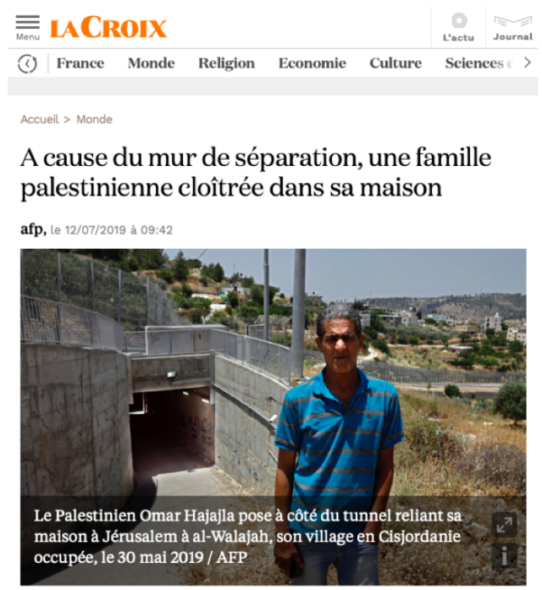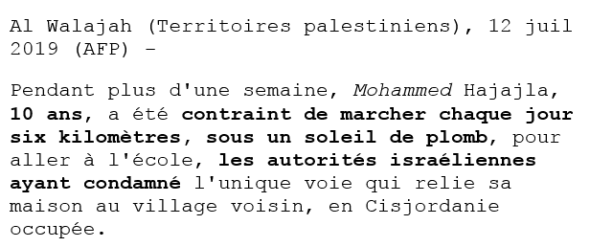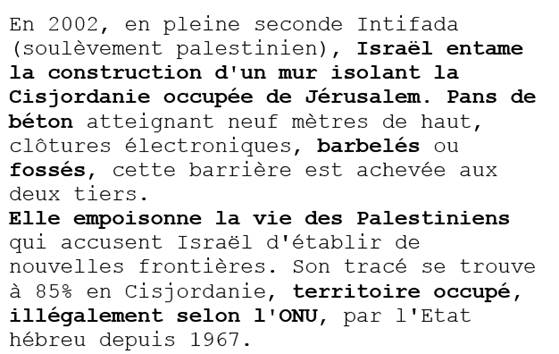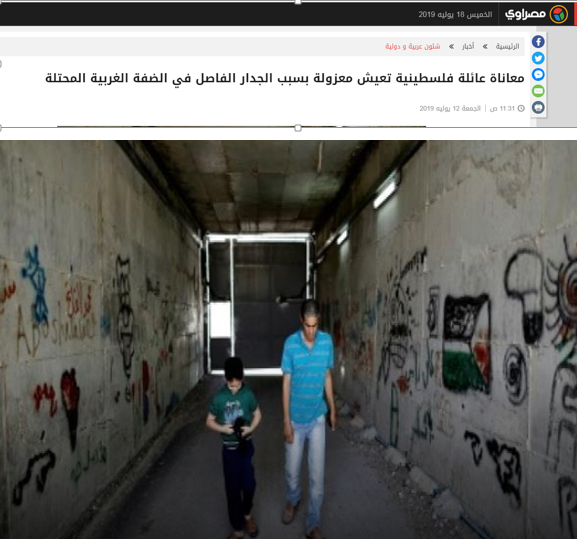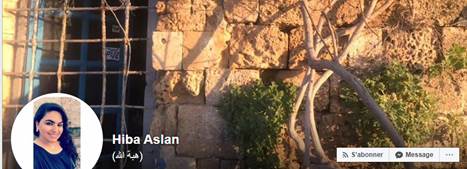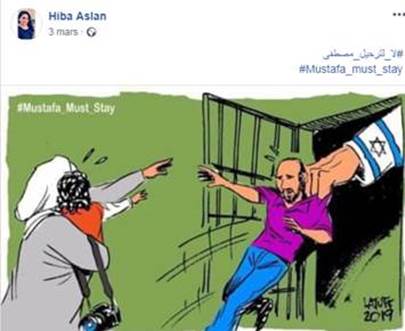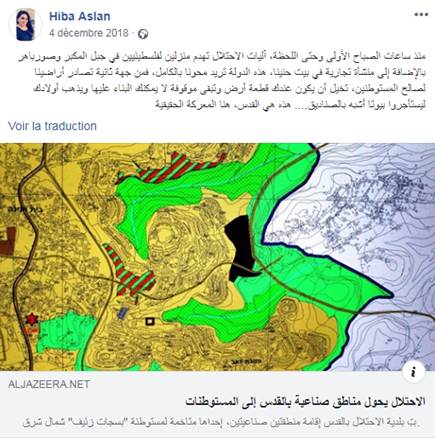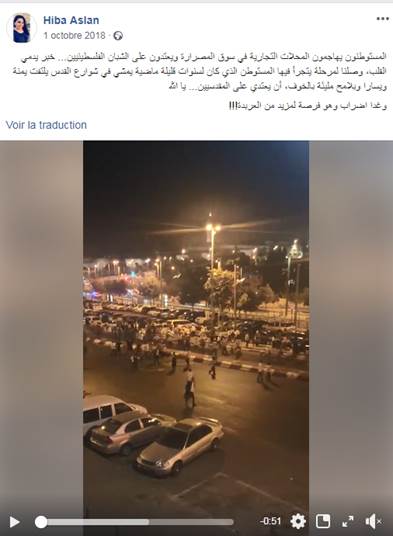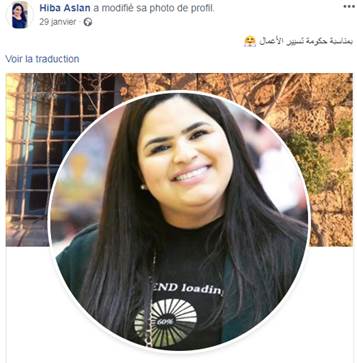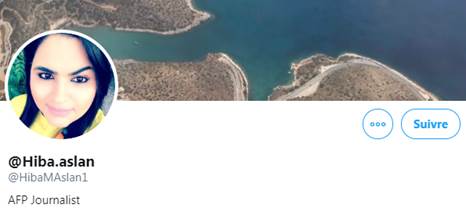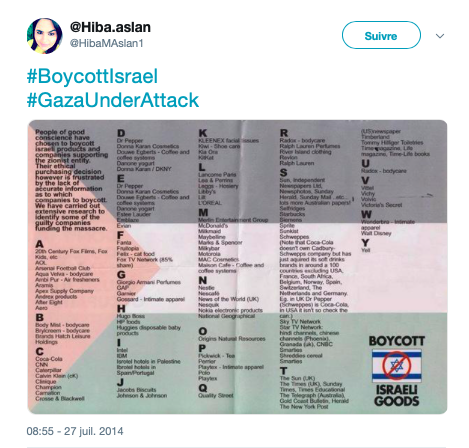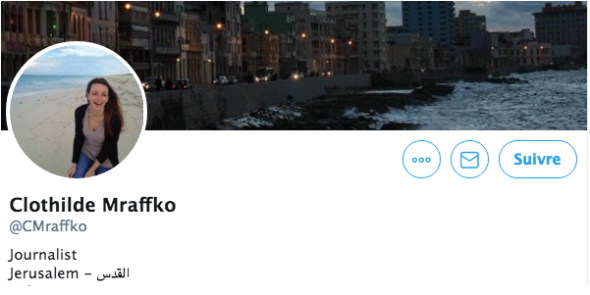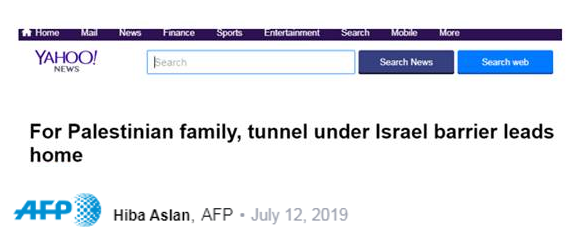A longer version of this article first appeared in French at InfoEquitable, a Paris-based organization that promotes accurate and professional coverage of Israel in the French media. It was translated by CAMERA staff.
A July 12th French-language Agence France-Presse (AFP) news dispatch recited the daily afflictions experienced by a Palestinian family whose home was separated from the rest of the village by Israel’s security barrier (“Because of the separation wall, a Palestinian family is imprisoned in their house”).
Picked up by several French newspapers including La Croix, Le Point, and L’Express, the wire service report included several obvious falsehoods.
In response to communication from InfoEquitable, AFP editors acknowledged “some inaccuracies” and then, six days later, released a new, corrected version of the report.
An Unbalanced, Tendentious News Report, Riddled With Gross Errors and Anti-Israel Falsehoods
On July 12, the French wire service distributed this dispatch to newsrooms:
Translation of headline: “Because of the separation wall, a Palestinian family is imprisoned in their house”
Translation of caption: Palestinian Omar Hajajla poses near the tunnel connecting his house in Jerusalem to al-Walajah, his village in the occupied West Bank, May 30, 2019/AFP
The headline itself was false: The story was not about a “wall” but a “security fence,” as became evident later in the article. Evoking “the wall,” however, is a standard element of Palestinian propaganda. “Wall” is an incriminating word, associated with sensational images, and is more effective at painting Israel as villain.
The report focused on the Hajajla family whose house is separated from the village of Walajah by Israel’s security barrier. Israeli authorities built a tunnel underneath the barrier to allow them easy access to the other side and for eight days, this tunnel was temporarily closed (for reasons that will be explained below). Agence France Presse turned the story into a relentless indictment of Israel.
The report began by establishing Israel as a tormentor of young children.
Translation: For more than a week, 10-year-old Mohammed Hajajla was forced to walk six kilometers every day in the blazing sun to go to school, as the Israeli authorities closed the only road connecting his house to the neighboring village in the occupied West Bank.
Readers learn that Mohammed lives with his parents “on a hill opposite the Israeli settlement of Gilo, built on Palestinian land” and that their house is separated from the Palestinian village of Al Walajah with a strongly secured fence.
This is followed by a prime example of misleading journalism —falsehood by omission.
Translation: In 2002, in the midst of the second Intifada (Palestinian uprising), Israel began erecting a wall isolating Jerusalem from the occupied West Bank. Made up of pieces of concrete up to nine meters high, electronic fences, barbed wire or ditches, this barrier is two-thirds completed.
It poisons the lives of Palestinians who are accusing Israel of establishing new borders. Its route is 85% in the West Bank, illegally occupied territory by the Jewish State since 1967, according to the UN.
That was the entire explanation. AFP failed to provide the reason for the construction of the so-called “wall.” The story contained no mention of the hundreds of suicide bombings perpetrated by Palestinian suicide bombers, responsibility for which was claimed by Hamas and Fatah terrorist groups. There was not a word about the thousands of Israeli victims whose deaths prompted Israel to erect a barrier to protect its civilian population.
According to the Agence France-Presse, the security fence serves no other function than to “poison the lives of the Palestinians,” evoking a modern-day version of the medieval blood libel used for centuries against the Jews.
The last misstatement was tersely phrased: “The occupation of the West Bank” is “illegal according to the UN.” It is a blatantly false assertion. As CAMERA’s Gilead Ini has pointed out in connection with a similar, corrected error at the New York Times:
Occupations are not illegal under international law, and it is untrue that the international community has deemed Israel’s occupation since 1967 to be illegal… George P. Fletcher, the Cardozo Professor of Jurisprudence at Columbia University School of Law has asserted about Israel that “it is not illegal for victorious powers to occupy hostile territory seized in the course of war until they are able to negotiate a successful peace treaty with their former enemies.”
In a report commissioned by the BBC, Noam Lubell, formerly of the dovish group B’tselem and currently a professor and Head of School at the University Essex School of Law, has likewise taken issue with those describing the occupation as “illegal,” and urged the BBC to refrain from such language. In that same report, he quoted Alain Pellet, whom Lubell calls “a notable expert on international law” and who, like Lubell, is a sharp critic of Israel, saying: “Even if the deprivation of its right to self-determination infringes an imperative norm of international law, occupation remains a legal institution, governed by the rules of law.”
Nor do any of the UN resolutions — General Assembly resolutions 2252, 2253, 2254, and 2256, and Security Council resolutions 236, 240, and 242 — argue that the capture of the West Bank from Jordan and subsequent occupation was unlawful. In fact, the drafters of the widely-cited UN Security Council Resolution 242, which called for an Israeli withdrawal from unspecified “territories occupied in the recent conflict,” have repeatedly clarified that their resolution calls for any Israeli withdrawal to be to “secure and recognized boundaries” negotiated in peace talks between the parties to the war, and do not regard the occupation as illegal: “Until that condition is met, Israel is entitled to administer the territories it captured – the West Bank, East Jerusalem and Gaza Strip – and then withdraw from some but not necessarily all of the land,” explained Eugene Rostow, one of the resolution’s drafters and an Under Secretary of State for Political Affairs in President Johnson’s administration.
The Oslo Accords, signed in 1993 by the Israelis and Palestinians and validated by the international community, set a legal framework for the military presence of Israelis in the West Bank.
Even though these agreements are old and forgotten, they have not been renounced by either party. Pending a final peace agreement, which may be slow in coming, Israel’s military presence — especially in Area C of the West Bank — is not considered “illegal” by the UN or international legal scholars.
Israel’s Point of View Falls by the Wayside
Readers seeking to understand the other side of the story must content themselves with the bare minimum— AFP devoted just one line to it:
When questioned, the Israeli army referred AFP to the police who did not answer.
On the other hand, the journalist had much better luck with the far-left organization B’Tselem (known for its wholesale condemnation of Israel ) and quoted its spokesperson extensively:
Security is an excuse for all Israeli violations. It’s a pretext for denying Palestinian property rights on these lands,” determines Karim Joubran of B’Tselem, an Israeli NGO opposed to the occupation in the Palestinian Territories. According to him, the location of the village – that includes 3,000 inhabitants – with its springs and farmland make it a prime target for settlement.
A Report that Contradicts AFP’s Code of Ethics
One need only consult AFP’s own Charter of Best Editorial and Ethical Practices, published in June 2016, to see that its reporter paid them little heed. 
At the top of its “10 guidelines,” Agence France-Presse states that “journalists provide accurate, balanced and unbiased news” and that “they correct their mistakes transparently.”
Their second golden rule emphasizes that “AFP journalists aim for neutrality, without prejudice or preference. They do not relay any outside influences.”
Alerted by InfoEquitable, AFP Recognizes its Errors and Rewrites the Report
Before publication of this article, we contacted Agence France-Presse with our observations. Taking our complaints seriously, AFP management responded in less than 24 hours with the following letter from the deputy editor-in-chief of the Cyprus office, from which the Middle East news is distributed.
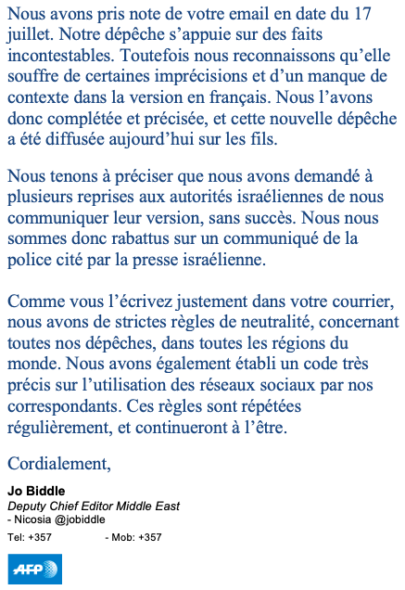 Translation: We took note of your email dated July 17th. Our dispatch is based on indisputable facts. However, we recognize that it suffers from some inaccuracies and lack of context in the French version. We have therefore filled in and clarified the information, and the new dispatch has been sent out. We want to point out that we asked the Israeli authorities several times to provide us with their version, without success. We therefore relied on a police statement quoted by the Israeli press. As you correctly write in your letter, we have strict rules of neutrality concerning all of our dispatches, in all regions of the world. We have also established a well defined code of ethics on the use of social media by our correspondents. These rules are regularly reinforced to journalists, and will continue to be.
Translation: We took note of your email dated July 17th. Our dispatch is based on indisputable facts. However, we recognize that it suffers from some inaccuracies and lack of context in the French version. We have therefore filled in and clarified the information, and the new dispatch has been sent out. We want to point out that we asked the Israeli authorities several times to provide us with their version, without success. We therefore relied on a police statement quoted by the Israeli press. As you correctly write in your letter, we have strict rules of neutrality concerning all of our dispatches, in all regions of the world. We have also established a well defined code of ethics on the use of social media by our correspondents. These rules are regularly reinforced to journalists, and will continue to be.
Cordially,
Jo Biddle
Deputy Chief Editor Middle East
On July 18, AFP distributed a new version of the original wire story of six days earlier.
Translation: (headline) Isolated by the Israeli barrier, a Palestinian family is imprisoned in its house
Here again is a dispatch originally released on July 12th, with added details, clarification and context
Al Walajah (Palestinian territories), July 18th 2019 (AFP)
It is now this revised version that can be currently found on the internet, as in the version below by L’Obs.
Under the same headline, the story remains largely hostile to Israel, but the most egregious errors have been removed. There is no longer mention of “the wall,” no more “illegal” occupation, no more “poisoning” of the lives of Palestinians. And the wave of suicide bombings that led to the construction of the barrier is now noted.
Different versions in Arabic, French and English
We checked other language versions of the article. In addition to the French dispatch, we found one in English and another in Arabic.
The First Version, in Arabic
The first version of the report was written in Arabic by a Palestinian journalist from AFP’s Jerusalem office. We found the text on the popular Egyptian news website Masrawy and had it translated.
The text is similar to the French version, with some variations. The tone is overall anti-Israel and the headline refers to the “wall” of separation, just as in the French wire story. In addition, it refers to the father’s claim of having been “beaten” by Israeli soldiers, an allegation that was not reported in either the English or French versions.
And like the French version, the Arabic version does not clearly explain the reasons that led the Israelis to erect the “security fence”– no mention of Palestinian terrorism, although it does make mention of the Palestinian intifada:
The Israeli authorities began building the”security fence “that Palestinians consider “apartheid wall” “at the height of the Palestinian intifada (2000-2005) in order to separate its territory from the West Bank.
The Arabic version, in contrast to the French one, does not refer to Israel’s military presence in the West Bank as “illegal.”
Who Wrote The First Dispatch (in Arabic)?
The Arabic dispatch is signed Hiba Aslan. AFP’s Jerusalem office hired this young Palestinian last March. As an Arabic-speaking journalist, it was she who interviewed the Hajajla family and who wrote this first dispatch. We wanted to know a little more about Hiba Aslan and checked her Facebook page:
On her Facebook page, she identifies herself as an AFP journalist.
Judging by what we found, it appears that the new recruit in the Jerusalem office has a history of activism. On March 3, she posted this tendentious cartoon suggesting that Israelis spend their time arresting peaceful family men.
Last winter, December 4, 2018, Hiba Aslan alerted internet users to an Israeli military operation in the West Bank. She wrote :
Translation: “Since dawn, the occupation forces have been destroying two Palestinian houses (…) This country wants to eliminate us completely, to confiscate our lands for the benefit of the colonists … The real fight is here in Jerusalem…”
Several weeks earlier, on Oct. 1, she had posted a video of incidents in Jerusalem accompanied by an unambiguous commentary:
Translation: “The settlers attack the shops of the souk and abuse young Palestinians … It’s terrible, we’ve arrived at this stage where the colonist dares … While a few years ago, he was afraid to walk the streets, looking to the right and left, today he is attacking the residents. The confrontation of tomorrow is occasion for a burst of dignity!”
And these are just a few examples, there are others.
Since we spoke to AFP, Hiba Aslan has scrubbed her Facebook page and has restricted access to it.
Hiba’s Carefully Chosen Vocabulary
In her Facebook posts, Hiba Aslan does not refer to “the Israeli army,” “Israeli soldiers” or the “IDF.”
She routinely uses the terms “occupation (al-Ihtilal)” or “occupation forces” which is the jargon used by Palestinian propagandists.
Her Twitter Feed is Even More Incriminating
In July 2014, Hiba Aslan tweeted a caricature of Orthodox Jews performing a ritual dance around a Palestinian child who is on fire.
A few days later, she tweeted a call to boycott Israel with a list of “Israeli products and companies supporting the Zionist entity.”
When a Twitter user questioned why a certain company is included on the list, Aslan responded:
Translation of her mangled English: “I don’t know, but maybe the company is owned by a Jewish person. Google it.”
These tweets and Facebook messages predated Hiba Aslan’s employment at AFP which began on March 17. Since then, the journalist seems to have moderated her posts, following the AFP guidelines which requires its employees to refrain from taking activist positions on social networks.
Nevertheless the anti-Israel tone and spirit of her AFP story is consistent with the animus displayed in her earlier Facebook posts and Tweets.
Who Added To the French Version?
The French version was written by a French-speaking journalist at AFP’s Jerusalem office: Clothilde Mraffko.
According to the protocol at AFP, her initials – cmr – appear at the bottom of the text, alongside those of Hiba Aslan.
Clothilde Mraffko “adapted” the French text, adding her own contributions. She was responsible for the infamous passage about the security barrier:
Translation: “It poisons the lives of Palestinians who accuse Israel of establishing new borders. Its route is 85% in the West Bank, illegally occupied territory, according to the UN…”
A Much More Balanced and Impartial English Version
The English version of the report was much more professional and objective than the French.
The English version clearly explains that when the barrier was installed in 2002, the Hajajla family was given the choice to either leave the premises (in exchange for compensation) or to remain in their home with the fence separating the house and town:
The Israeli authorities had given the family the choice: leave or to see their home cut off by a fence.
In the French text, the sentence became:
The Israeli authorities then imposed an impossible choice on the family: to leave or to see their house encircled by a fence.
Moreover, the paragraph summarizing the case is introduced with the following subtitle:
Translation: Sequestered or displaced?
The Hajajla family is, of course, not “sequestered.” Nor does this appear in the English version, being obviously false.
The Reason for the Tunnel’s Closure
The ultimate solution will be determined in court. Meanwhile, the Israeli authorities built (at their own expense) a concrete tunnel under the fence that gives the Hajajlas access to the village. But recently, Israeli authorities closed the tunnel for several days.
The English version, in the fourth paragraph, clearly explains why the Israeli authorities banned access to the tunnel:
Israeli authorities say the closure was because the family was suspected of allowing illegal crossings into Jerusalem from the West Bank through the Israeli-built tunnel.
Later, it provides more details:
In a statement to the Israeli newspaper Haaretz, police said Omar Hajajla “is suspected of taking advantage of the gate to improperly bring Palestinians through it and was therefore taken in for questioning. All investigations that involve suspicion of security-related crimes of Palestinians result in the revocation of entry permits into Israeli territory until the suspicions can be clarified and/or an indictment filed.”

